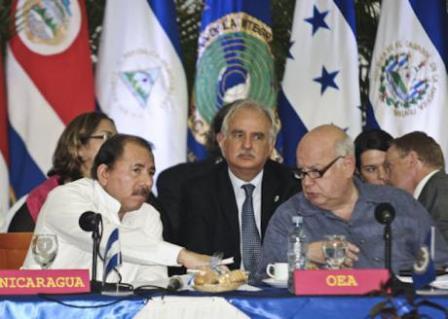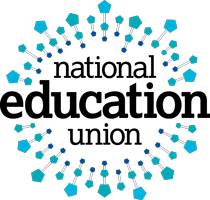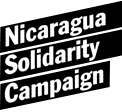US hypocrisy rules: the case of Nicaragua versus Honduras
NSCAG News |
on: Friday, 19 January 2018

Picture from opendemocracy.net
One of the reasons given by those promoting the proposed NICA Act in the US was the supposed bias in Nicaragua's electoral process. Yet the US has remained silent and indeed continues to praise its allies in Honduras, which is where the real scandal lies and where the November election is widely regarded as a fraud. The contrast in the US's approach to Nicaragua and Honduras is startling, as illustrated below:-
Nicaraguan municipal elections 5 November, 2017
The 60 person Organisation of American States (OAS) mission who observed the elections congratulated the Nicaragua government on the largely peaceful nature of the process. The FSLN won in 135 of Nicaragua’s 153 municipalities.
The report of the OAS mission highlighted some flaws and recommended changes to the electoral law but pointed out that this would not have affected the outcome.
The Nicaraguan government has accepted the criticisms and pledged to work with the OAS to continue to strengthen the institutionality and transparency of its electoral processes.
US reaction: continue with proposed plans for sanctioning Nicaragua
On 22 December, the NICA Act introduced to the US Senate. If approved this would mean that the US would block loans to Nicaragua by international lending institutions until, to the satisfaction of the US State Department, the Nicaraguan government takes effective steps to ‘hold free, fair, and transparent elections overseen by credible domestic and international electoral observers and promote democracy, as well as an independent judicial system and electoral council.’
Honduran presidential and congressional elections, 26 November,2017
On 17 December, the Supreme Electoral Council (TSE) declared Juan Orlando Hernandez, the candidate favoured by the US, as the winner by a margin of 1.53% over the opposition Alliance candidate Salvador Nasralla.
Widespread protests followed by human rights organisations and social movements. These protests were brutally suppressed by government forces resulting in the deaths of 35 people. Amnesty International stated: ‘The Honduran government is deploying dangerous and illegal tactics to silence any dissenting voices in the aftermath of one of the country’s worst political crises in a decade, including preventing lawyers and human rights activists from visiting detained demonstrators.’
Following this announcement the OAS observer mission called for new elections on the basis that the electoral process was so deeply flawed that it was impossible to be confident of the results. OAS secretary general Luis Almagro described the process as being of ‘very low quality’ technically, plagued by irregularities, and lacking integrity.
US reaction: ‘validation of the crime of electoral fraud.’
The US State Department issued a declaration stating that the ‘The Honduran people exercised their democratic rights by taking part in elections on November 26. The United States looks forward to working with the democratically elected leader of Honduras.’
Manuel Zelaya Rosales, opposition co-ordinator and a former President ousted by the US backed 2009 coup, condemned the State Department response, saying it "validates the crime of electoral fraud."
See also blog by John Perry on





